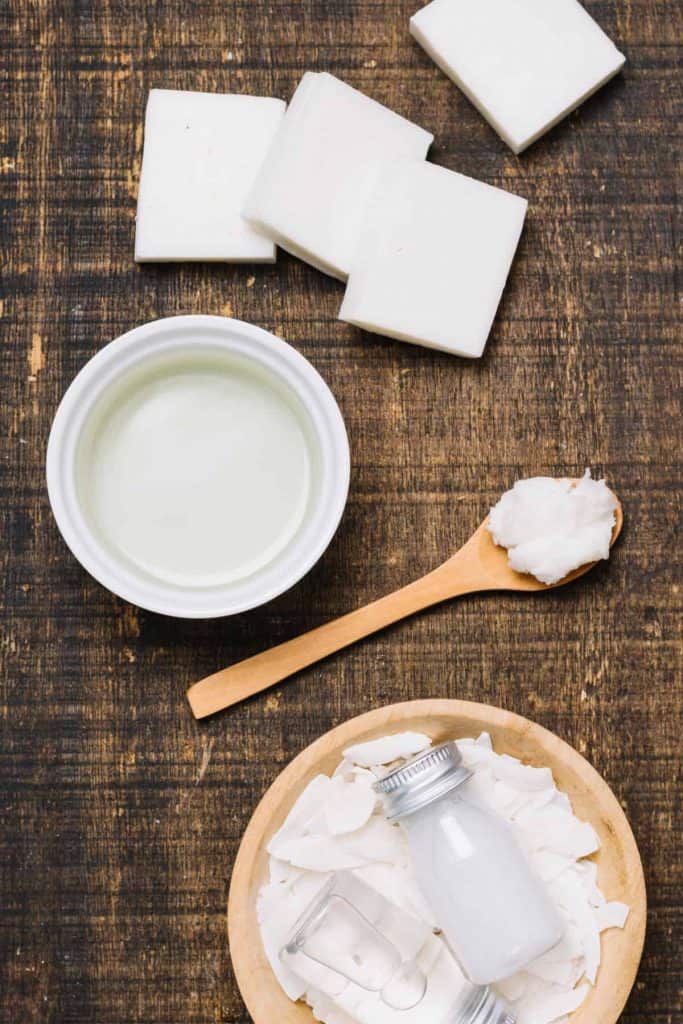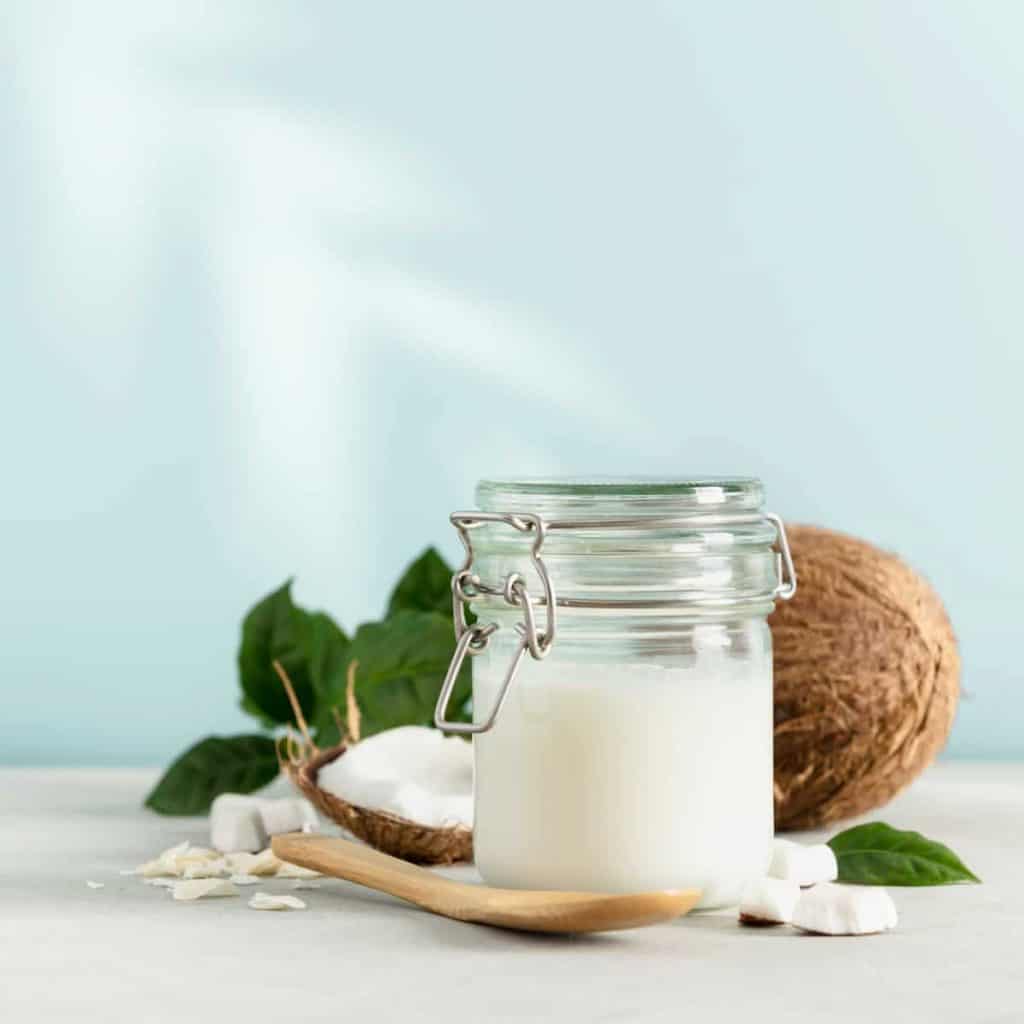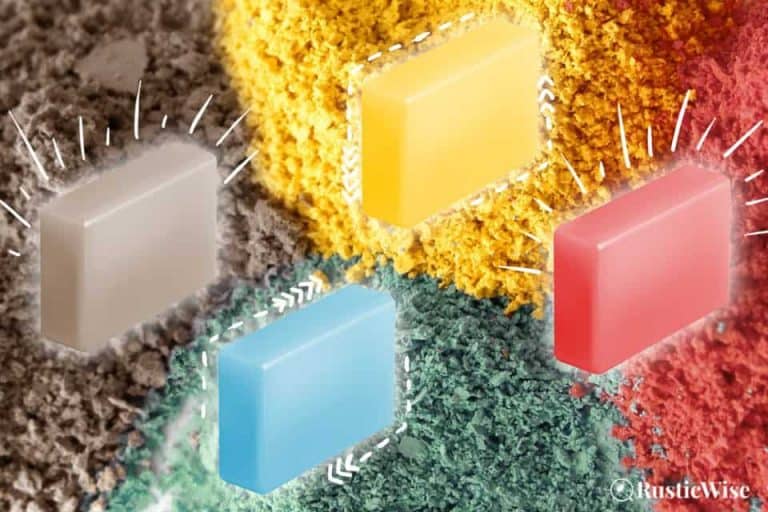6 Skin Nourishing Coconut Oil Benefits in Soap
Coconut oil is an edible vegetable oil derived from the pressed flesh of fruit from the coconut palm tree (Cocos nucifera). While coco oil is used for cooking, it also offers many benefits for skin and hair.
One of the easiest ways to reap the rewards of this rich ingredient is to use it in natural soap. There are many coconut oil benefits in soap. When used on skin, coconut provides cleansing and moisturizing properties. It’s also antibacterial, anti-inflammatory, and high in vitamin E—impressive properties that promote a healthy complexion.
Let’s take a closer look at coconut soap benefits and how using coconut oil for skin may keep your epidermis firm and youthful.
A quick glance at coconut oil
When it comes to selecting a versatile quality oil for cooking, beautification, and medicinal purposes, look no further than coconut oil. Of the many plant-based oils available on the market today, coconut oil has a unique fatty acid composition, rich in medium-chain fatty acids, aka medium-chain triglycerides (MCTs).
Made primarily of saturated fats (90 percent) compared to 10 percent unsaturated, coco oil is a white solid at room temperature.
It’s these unique saturated fatty acids that comprise the healing components of this veggie oil. Here’s the fatty acid breakdown:¹
- Lauric acid (49 percent)
- Myristic acid (18 percent)
- Palmitic acid (8 percent)
- Caprylic acid (8 percent)
- Capric acid (7 percent)
- Oleic acid (6 percent)
- Linoleic acid (2 percent)
- Stearic acid (2 percent)
Lauric acid, a main component of coco oil, is a saturated fatty acid with special properties. From lauric acid derives a component called monolaurin (a monoglyceride) that contains special bacteria fighting capabilities.
These antimicrobial properties play an important role in skin care, as we’ll look at below.

Credit: Vector State
Main types of coconut oil
There are many types of coconut oil to choose from. Most can be categorized as refined or unrefined (aka virgin coconut oil).
- Virgin or unrefined: Virgin coconut oil (VCO) also goes by extra virgin or unrefined coconut oil. It comes from the pressed (fresh) coconut flesh and contains mostly short-chain fatty acids. It undergoes minimal processing. Many people like virgin coconut oil for skin as it keeps its coconut-y aroma and has more of its nutrients and vitamins intact.²
- Refined: You may see refined coconut oil labelled as RBD, which stands for Refined, Bleached, and Deodorized. This type of oil has a neutral scent and taste. Refined coconut oil is machine-extracted from copra, then undergoes steaming or heat processing to remove the aroma. It’s then further “bleached” or filtered by using bleaching earth and/or activated carbon to remove impurities.
- Melting points: Most coconut oils have a melting point of 76 degrees Fahrenheit (24 degrees Celsius). 76-degree coco oil is the most common type you’ll find at most grocery stores as well as beauty and soap suppliers. You’ll also see some labelled as “92 degree”, which indicates a higher melting point.
While you can use either VCO or RBD coco oil for soap making, most stick with refined as you can get more consistent results, and it’s often more affordable at most soap supply shops.
Tip: Use only pure coconut oil for skin for best results. Look for products labelled “cold pressed” and avoid products extracted with chemical solvents.

Credit: Vector State
6 coconut oil benefits in soap
So now that we know a bit more about this popular oil, let’s take a deep dive into its benefits in soap.
Coconut oil is a popular base oil for many soap recipes because it’s widely available, fairly affordable, and has many skin-loving properties.
At a glance, here are a few coconut oil benefits in soap:
- Highly cleansing.
- Produces fluffy lather in soap bars (bring on the bubbles!).
- Moisturizing (in small amounts).
- Skin healing properties (antimicrobial).
- Promotes healthy skin (rich in vitamin E antioxidants).
- Adds hardness for a longer lasting bar of soap.
1. Highly cleansing
Some soaps made primarily of olive oil are highly conditioning, but lower on the cleansing scale. Not so with coconut oil soap!
By nature, homemade soap bars made primarily of saturated fats are effective cleansers—great at removing dirt and grease.
The high saturated fat content in coco oil, particularly the lauric acid, makes for a cleaning powerhouse.
2. Big, bubbly lather
While the ingredients are the most important aspects of any soap bar, bubbles are still an integral part of the soap-lovers’ experience. Coconut oil soap bars produce that nice, fluffy lather most of us love.
While these soap bars are suitable for most types of skin, they have a special appeal to those who love lather. Soaping up your skin with coconut oil bars not only creates a nice, bubbly lather, but it can also make your skin look and feel younger and softer.
3. Moisturizing properties
Coconut oil is one of the best multitasking oils you’ll find. Use it as a makeup remover, hair mask, lip balm, massage oil, and as a skin moisturizer by itself. And of course you can add it to soap recipes.
When used at the proper ratios in soap recipes and body care formulations, coconut oil can be highly moisturizing.
The medium-chain triglycerides found in coco oil help to moisturize skin by retaining water and creating a barrier in the skin.
Those who live in the tropics have long used coco oil as a natural moisturizer. One 2004 study looked at the moisturizing capabilities of coconut oil and mineral oil and its effects on people with xerosis. Xerosis is a common skin ailment characterized by itchy, scaly, or dry skin. Most people with xerosis have a weak skin barrier. Participants used either mineral oil or coco oil on their legs for 2 weeks.
The results showed that participants who used coconut oil experienced, “significant improvement in skin hydration and increase in skin surface lipid levels.”³
Tip: Too much can be a bad thing. For most DIY soap recipes, keep the percent of coconut oil to 30 percent or less. If you have dry or sensitive skin, keep it to around 10 to 15 percent.
4. Antimicrobial and anti-inflammatory properties promote wound healing
The benefits of coconut oil are many, as it contains unique biologically active components which may help heal wounds.
One 2010 study examines a group of young rats with dermal wounds and whether the topical application of VCO had any effects over a period of 2 weeks.
Rats that received a layer of virgin coconut oil on skin wounds showed quicker healing times and improved collagen production, amongst other factors.⁴
Aside from wound healing, the antimicrobial, anti-inflammatory, and antiviral properties in coco oil may be helpful in a wide range of skin conditions, including eczema, acne, and psoriasis.
Fungal infections such as athletes’ foot and ringworm are also kept at bay with the use of this healing oil.
The monolaurin derived from the high lauric acid content in coco oil works to break down the lipid membrane of lipid-encased bacteria such as:¹
- Propionibacterium acnes
- Staphylococcus aureus
- Staphylococcus epidermidis
- Pseudomonas aeruginosa
- Escherichia coli
- Proteus vulgaris
- Bacillus subtilis
The takeaway: Dry, cracked skin creates an environment for bacteria to easily thrive and spread. Coconut’s ability to deeply moisturize AND keep skin free of harmful microbes and pathogens makes it a useful skincare ingredient.
5. Promotes healthy skin
Rich in vitamin E, a powerful antioxidant which fights free radicals, coconut oil can be part of a healthy skincare regime.
Vitamin E boosts photoprotection in skin, protecting it from harmful UV rays after sun exposure. Skin inflammation is a key symptom of damage from UV ray exposure. Luckily coconut oil also helps to soothe symptoms of skin inflammation, including swelling, redness, or thickness.⁵
6. Adds hardness for a longer lasting bar of soap
The high saturated fat content in coco oil produces a harder, longer lasting bar of soap. While this may not seem like a big deal, soap hardness is an important component to consider when crafting your own homemade soap.
Soaps that are too soft rinse away quickly in water.
Coconut oil is considered a “hard oil” in the world of soap making. Hard oils are those that are solid at room temperature such as coconut, palm oil, shea butter, and cocoa butter. A good ratio of hard oils to soft oils (those that are liquid at room temperature) makes for a better bar of soap.

The downsides of using coconut oil in soap
While many people are eager to tout the benefits of this natural plant-based oil, there are, of course, some downsides.
- Allergies: While coconut oil is generally good for most skin types, some people may be allergic to coconut, or coconut-derived products. This often appears as contact dermatitis, which includes skin rashes or itchiness. (Check out our article about coconut oil free soap recipes.)
- May be drying: Another downside of coco oil is that it’s drying if added in high ratios. As it’s a super cleanser, soap bars that contain over 30 percent coconut oil may be too effective at cleaning skin, resulting in dry, itchy skin. Often, most soap recipes pair a cleansing hard oil like coconut with soft and conditioning oils such as safflower oil or olive oil.
- May not be suitable for oily skin: While coconut oil has many proven skin benefits, it’s not suitable for all skin types. If you have oily skin, or sensitive skin, it’s best to try a small 24 hour patch test first before using on your skin.
Sutter Health (a not-for-profit health care system based in California), makes the following recommendation: “…if you are prone to break out with acne from other heavy moisturizers, then it is highly likely that coconut oil will have the same effect. Oil-containing products trigger acne in susceptible individuals. If you are not prone to acne from moisturizers, it should be fine to use.”⁶
Other ways to use coconut oil for skin and hair
Besides adding to handmade soap (or cooking with it), coconut oil has a wide range of uses for skin and hair. If you have a big tub of coco oil to use up, try some of the following treatments:
- Makeup remover
- Face cleanser
- Conditioning oil for stretch marks
- Hair mask to treat dry ends
- Nail treatment for dry cuticles
- Massage oil
The final word on coconut oil benefits in soap
Natural, vegan, and widely available, coconut oil is a versatile and handy product to keep on hand. It’s a great alternative to chemical-based products and it won’t break the bank. Using coconut oil for skin is a popular way to reap the benefits of this plant-based oil rich in vitamin E.
Using coconut oil soap is one of the easiest ways to apply this nourishing oil topically. The key component, lauric acid, contains antimicrobial, anti-inflammatory, and antiviral properties. This is useful for treating a wide range of skin conditions like acne, eczema, psoriasis, and more. For beauty, it keeps skin looking healthy with deep moisturizing qualities.
Related questions
Can I make a pure coconut oil soap bar?
Yes, it’s possible to make a bar of soap with 100 percent coconut oil, but you’ll need to bump up the superfat content (up to 20 percent superfat compared to 5 percent for a regular bar of soap). A pure coconut oil soap bar that does not have more superfat would be very drying indeed. The increased superfat ensures your skin is left feeling clean and moisturized—not dry.
A pure coconut soap bar would create a white bar of soap that’s hard, and long lasting, with plenty of bubbles. Sometimes people make a pure coconut oil soap (with regular superfat) for laundry to get the most of coco’s cleansing properties.
New to making soap? 🧼❓
👉We have a fantastic overview on the whole soapmaking process here: read our Timeless Guide To Soapmaking.
If you would like to see our soapmaking posts organized by topic type, see our Soapmaking Collection.
Would you like more timeless tips via email?
Fun tips to help you live an independent, self-sustaining lifestyle. Opt-out at any time.


References
- Lin, T. K., Zhong, L., & Santiago, J. L. (2017). Anti-Inflammatory and Skin Barrier Repair Effects of Topical Application of Some Plant Oils. International journal of molecular sciences, 19(1), 70. https://doi.org/10.3390/ijms19010070
- International Coconut Community, Virgin Coconut Oil, https://coconutcommunity.org/products-detail/virgin-coconut-oil. Accessed March 2022.
- Agero, A. L., & Verallo-Rowell, V. M. (2004). A randomized double-blind controlled trial comparing extra virgin coconut oil with mineral oil as a moisturizer for mild to moderate xerosis. Dermatitis : contact, atopic, occupational, drug, 15(3), 109–116. https://doi.org/10.2310/6620.2004.04006
- Nevin, K. G., & Rajamohan, T. (2010). Effect of topical application of virgin coconut oil on skin components and antioxidant status during dermal wound healing in young rats. Skin pharmacology and physiology, 23(6), 290–297. https://doi.org/10.1159/000313516
- Oregon State University, Vitamin E and Skin Health, https://lpi.oregonstate.edu/mic/health-disease/skin-health/vitamin-E. Accessed March 2022.
- Sutter Health, Can Coconut Oil Be Used As a Moisturizer?, https://www.sutterhealth.org/ask-an-expert/answers/can-coconut-oil-be-used-as-a-moisturizer. Accessed March 2022.

Author: Theresa Tesolin
Theresa is co-founder of RusticWise. She helps people unleash their inner DIY spirit by encouraging them to get dirty and make or grow something from scratch.









